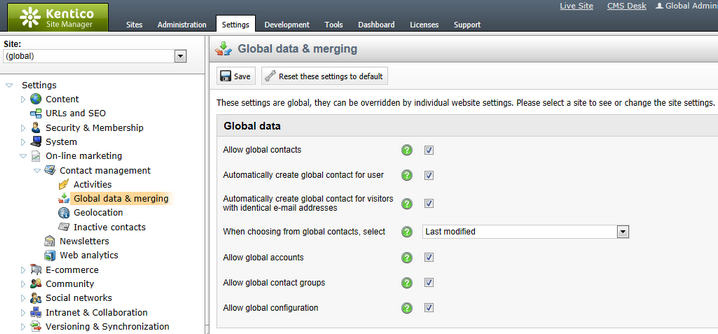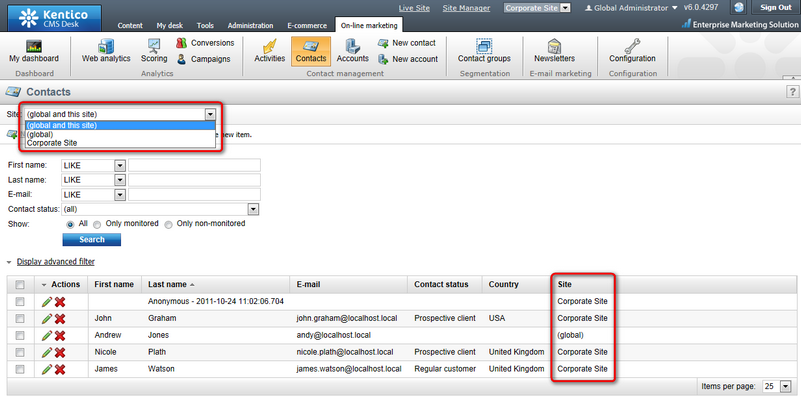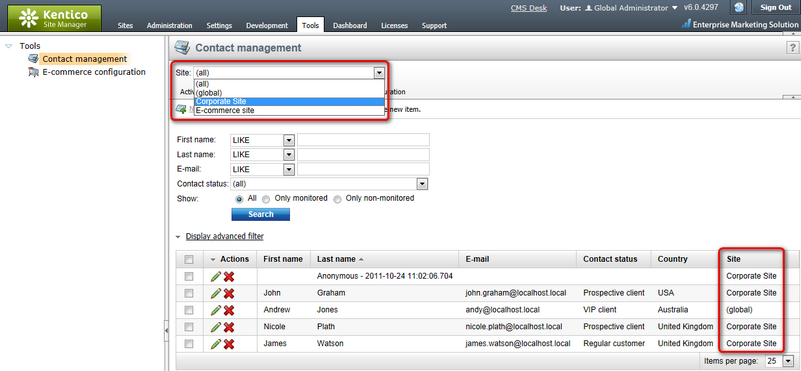Allowing the use of global objects |

|

|

|

|
|
Allowing the use of global objects |

|

|

|

|
|
|
||
The following objects can either be site-specific, i.e. available only for a single website, or global, which means that they are shared across all websites running in the system:
•Contacts
•Accounts
•Contact groups
•Account statuses
•Contacts statuses
•Contact roles
The use of global objects is disabled by default. To enabled it, go to Site Manager -> Settings -> On-line marketing -> Contact management -> Global data & merging and adjust the following settings in the Global data section:
•Allow global contacts - enables the use of global contacts.
•Automatically create global contact for user - if enabled and the system detects that there are multiple contacts associated with a user registered on more than one website running in the system, a new global contact will be created and the detected ones merged into it. If one of the detected contacts is already global, the others are merged into it instead of creating a new one.
•Automatically create global contact for visitors with identical e-mail addresses - if there are users with the same e-mail address across multiple websites, a global contact will be created for all site contacts associated with the given user.
•When choosing from global contacts, select - if there are multiple global contacts associated with a user, this setting determines which of them should be used as the primary one. The following options are available:
•Last modified - the contact that was most recently modified.
•First created - the oldest contact.
•Create a new contact - a new contact will be created and the other associated global contacts will be merged into it.
•Allow global accounts - enables the use of global accounts.
•Allow global contact groups - enables the use of global contact groups.
•Allow global configuration - enables the use of global contact statuses, account statuses and contact roles.

If global objects are allowed, the Site drop-down list is visible above the list of objects in the respective sections of CMS Desk (e.g. CMS Desk -> On-line marketing -> Contacts). The Site drop-down list offers you the following options:
•(global and this site) - both global and current site objects are listed.
•(global) - only global objects are listed.
•current site - only current site objects are listed.
When the (global and this site) options is selected, the Site column is added to the grid, indicating if the object is site‑specific or global. It is also not possible to create new objects in this case since it would not be clear whether the new object should be global or site‑specific. To create a new object, you either need to have a particular website selected in the Site drop-down list, in which case you create an object specific for the website, or you need to select the (global) option, in which case you create a global object.

If you manage contact management objects in Site Manager -> Tools -> Contact management, the Site drop-down list is always present and allows you to manage both global objects and objects of all websites in the system. The same conditions as described above apply here as well.
